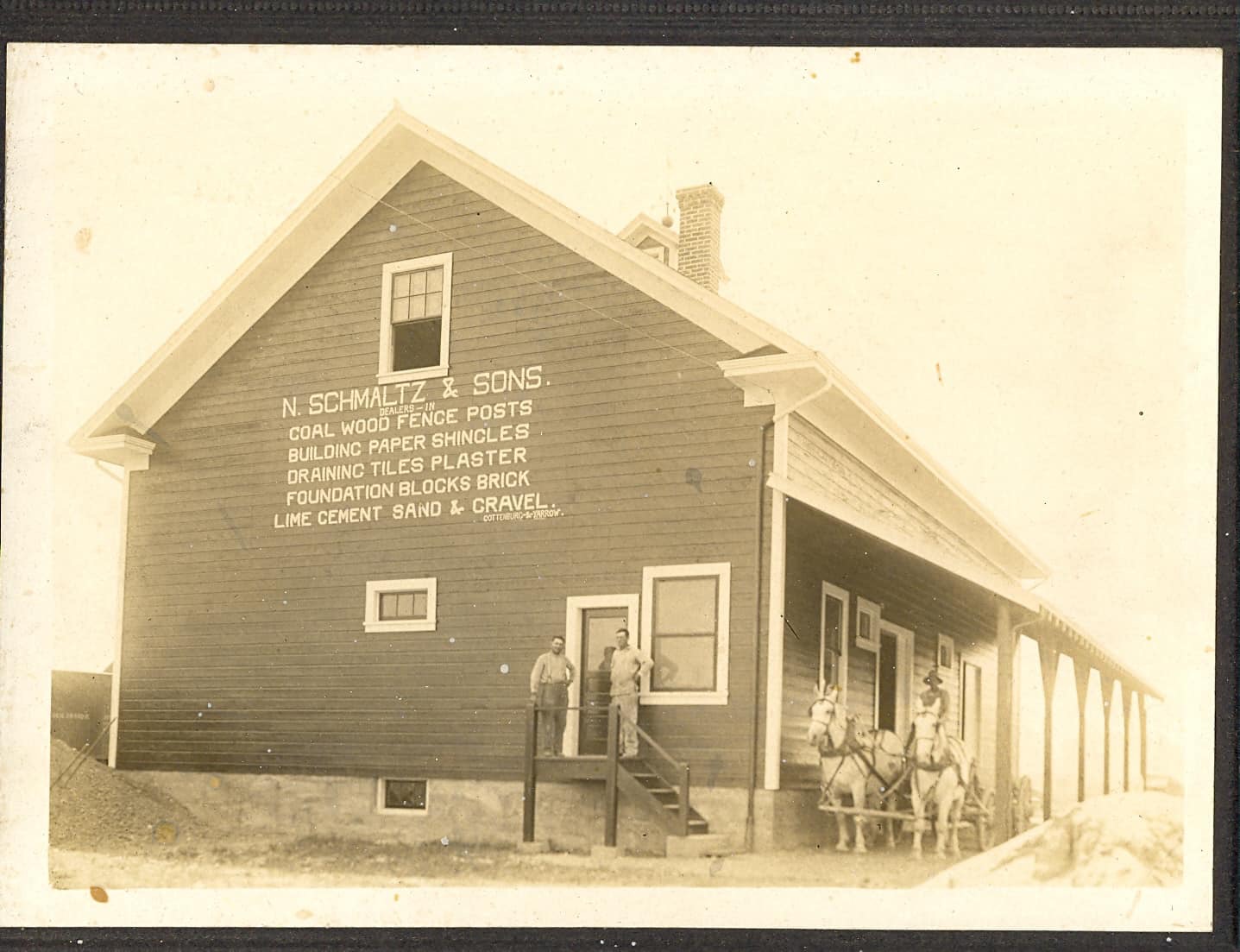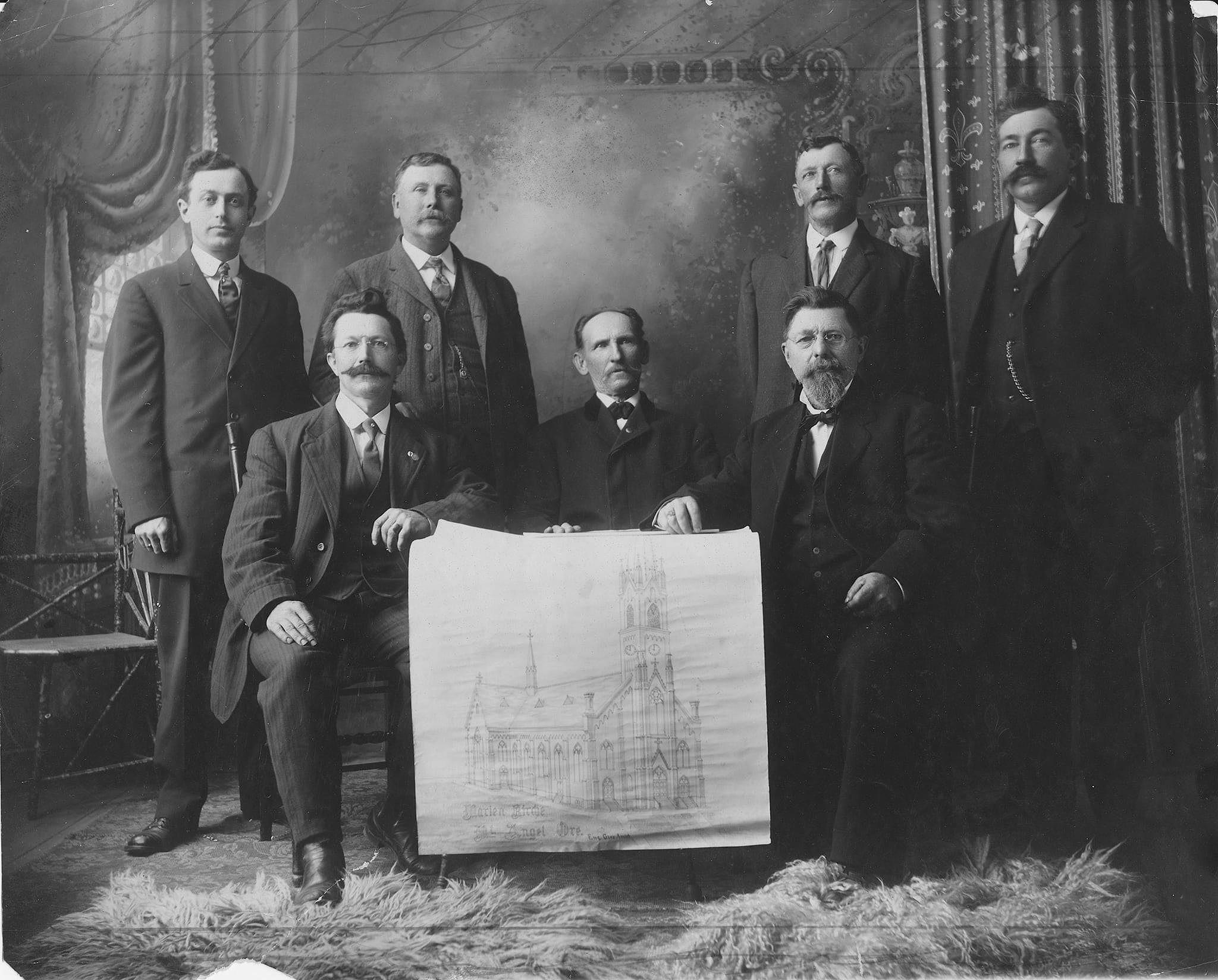MtAngel

Schmaltz & Sons Warehouse, Mt Angel, Oregon (circa 1910-15)
Mt Angel Historical Society
"There's only a plaque there now …"
Nick and Elizabeth Schmaltz had relocated from Devil's Lake, North Dakota, to Mt. Angel, Oregon, by August of 1909 when their youngest daughter, Lucy, was born. Fifteen years after emigrating from Ukraine, Nick had arrived in his Eden at the End of the Oregon Trail, a small city tucked into the northern edge of Marion County, Oregon. We no longer have cities like Mt. Angel in pre-WWI Oregon. Today, we classify Mt. Angel as a small town with few services. Then, it featured every service any city required. One could hop on a train connecting you to Salem or Portland. It featured a hotel with a ballroom. A pharmacy. A hardware store and, most prominently, Nick Schmaltz & Sons farm supply.
Further, Nick built a fine two-story home, the finest in town, across the square from the church. He served as a board member overseeing construction while no doubt supplying building materials properly discounted for ecclesiastical purposes.

(Nick Schmaltz with St. Mary's church construction board, far left bottom- circa 1908)
Mt. Angel was a German community in that everyone spoke German there. It featured both a monastery and a convent situated on a picturesque hill outside of town. The city itself was surrounded by some of the richest cropland in the world. Unlike Ukraine or North Dakota, Marion County, Oregon, features moderate temperature extremes. It might snow in the winter, but it never takes cold weather terribly seriously. Inclement weather there usually involves rain, of which they receive at least their fair share. Fields surrounding the town featured hop yards as well as wheat. Pretty much everything grows in this Eden at the End of The Oregon Trail, a place that must have reminded Nick of his family's Alsace roots.
I do not know how Nick became so successful. I imagine a lot of hard work was involved, but I also imagine him to have been quite a trader and perhaps an uncommon persuader. I understand that he and his family arrived in precisely the right place at unarguably the right time, for the farm economy would boom through the WWI years. His family was also coming of age at precisely the right time to successfully run an operation advertised as & Sons if only those sons would have cooperated. My father, who essentially grew up in Nick and Elizabeth's home after his mom and dad divorced, described his grandfather as a trying taskmaster. His brother Dan took great pleasure in riling the old man, often earning a beating and exile to the damp and spooky basement for his trouble. My dad recalled asking his brother if he couldn't see the punishments coming. My dad kept his head down and stayed invisible, a skill he passed on to me in turn.
Elizabeth doted on him and made him cheese buttons. He and Dan were often tasked with harvesting dandelions out of the yard so Nick could make wine out of them. The parlor in that grand house was absolutely off-limits unless it was Sunday and there were visitors. Even minor infractions received harsh punishments, … and they were grandkids. The sons and daughters grew up with a tyrant for a father. He might have been the most successful man in town, with his name prominently displayed as the benefactor of one of the church's grand stained glass windows, but he was Captain Bligh at home. He ultimately disowned all but his youngest child, Lucy. The rest were disowned for various infractions, each apparently having to do with violating Catholic sanctity. My grandfather Nick impregnated the pharmacist's wife when he was twenty-one. This necessitated a hasty charade so that everyone could credibly swallow the story that the child was not conceived out of wedlock. The marriage didn't last, divorce being yet another infraction.
Leo, his oldest son, married someone out of the faith, as did Mary and Magdalena Rose, Aunt Mac to my father. Each, in turn, betrayed the faith Nick's family had been faithful to since long before The Terror chased them out of Alsace a hundred and fifty years before. I suspect Nick's outrage was well-earned, even if it undermined his family. Nick died in 1933, aged 59. He was by all accounts a man of prodigious appetites. He was fortunate to find a place remarkably similar to his family's Alsace roots at the end of his westward migration. That huge warehouse he built burned to the ground a few years ago. There's only a plaque there now to mark where an immigrant from Ukraine left his considerable mark on the world.
©2024 by David A. Schmaltz - all rights reserved


